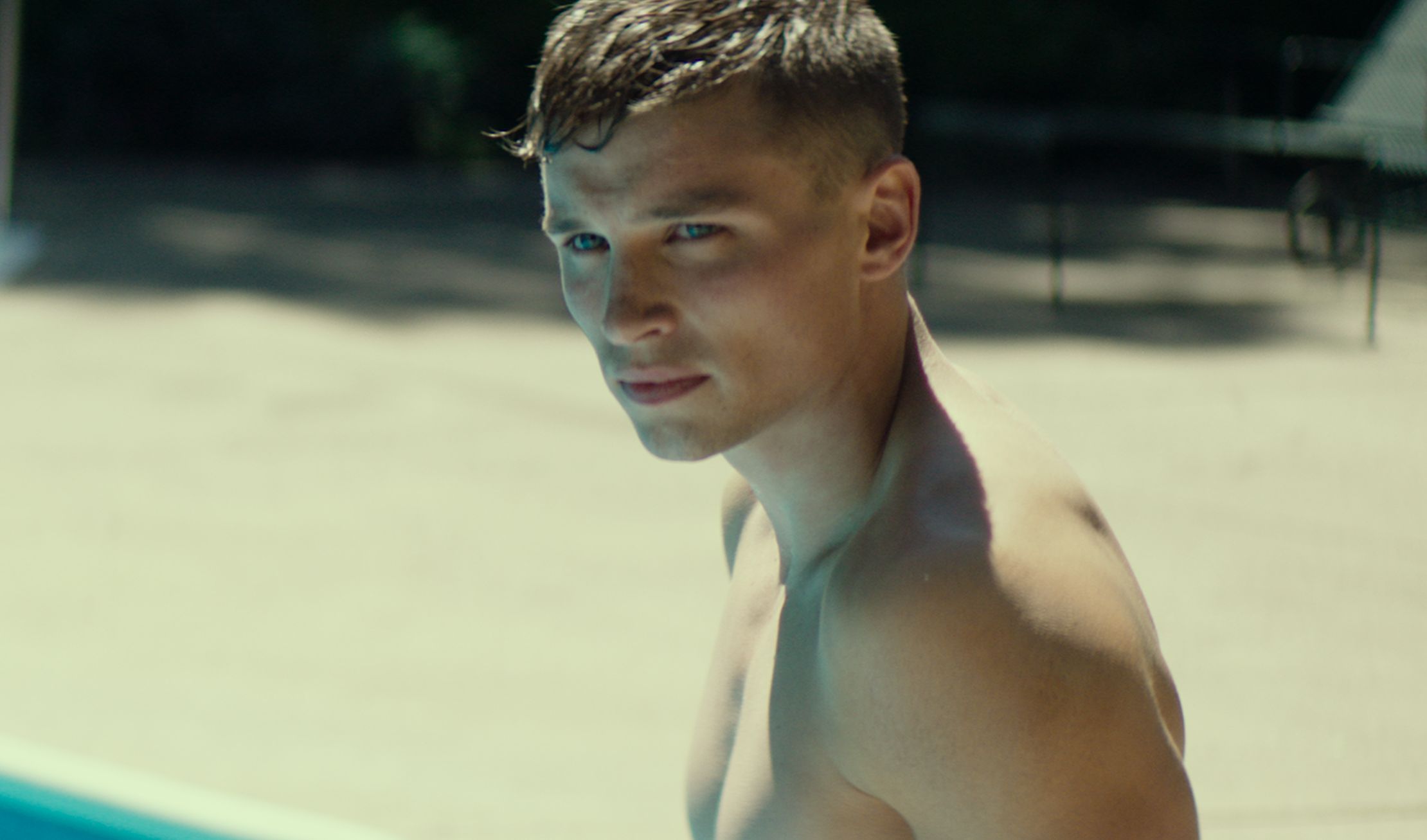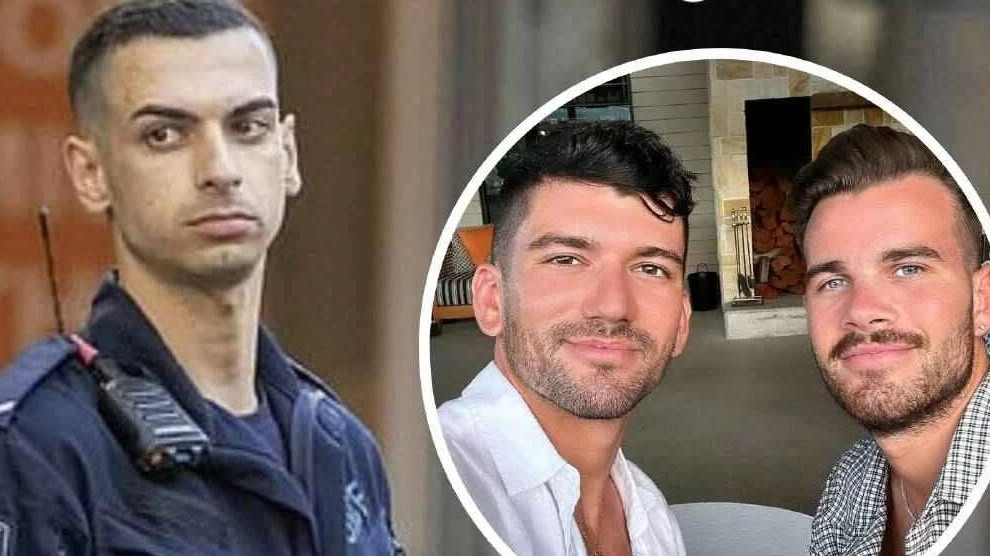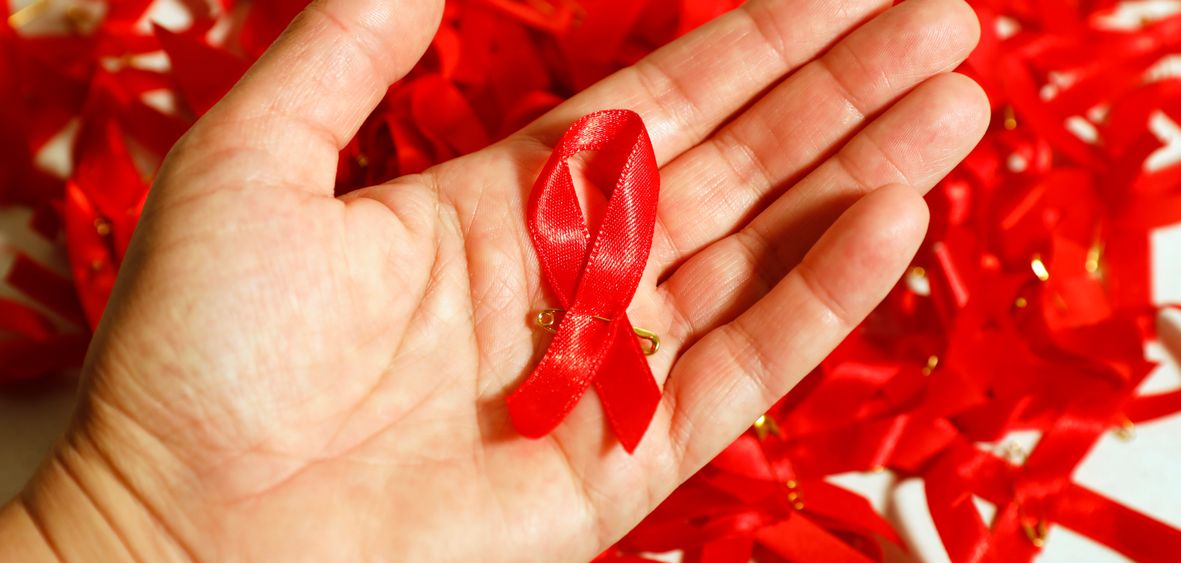
‘A love letter to gentle masculinity’: our interview with the director of Giant Little Ones

In Keith Behrman’s Giant Little Ones, toxic masculinity, homophobia, and sexual assault intersect in a startlingly thought-provoking film. Daniel Reeders reports.
***
At film festivals I always try to see something heavy and something light.
At Montréal’s Image+Nation queer film festival, it was my ‘light’ pick that left me thinking.
Canadian writer and director Keith Behrman’s new film Giant Little Ones features a nuanced performance by emerging talent Josh Wiggins (Mean Dreams), as his character Franky hits turbulence in a close friendship with fellow member of his high-school swim team Ballas (Darren Mann).
So far, so familiar, but viewers will find there’s a lot more to the film.
I spoke with Keith after he won the Vancouver Film Critics Circle award for best screenplay.
DR — After I saw it in Montréal I raved about it online, calling it ‘a love letter to gentle masculinity.’ Why did you think that letter needed writing?
KB — I grew up in a very masculine society, a small farming community, in the seventies. I always felt quite oppressed and sad about the fact it was so restrictive – about what one could express, or explore. The expression of manhood never made sense to me; I didn’t understand it, I thought it was quite alienating and lonely in some ways.
That just applies for everything — for sexuality, masculinity, what and how you can be in a wide range of ways. I got to the point where I became clear that I didn’t want to live my life restricted in that way. I knew this was so much more to love, when we could get past all those limiting identities and boundaries and barriers. There was so much fear in that other mode of masculinity.
DR — Plenty of films do a powerful job of showing the constrictiveness of masculinity, but your film shows an alternative to that — a masculinity that’s really careful, and generous, and ethical. Where did that come from?
KB — Mm. I guess it’s what I’ve always wanted to experience. My nature was very confused when I was growing up, because, I would flip back and forth between Dr Jekyll and Mr Hyde, I’d be really kind and generous and caring and sensitive, and then I would, you know, do horrible things to other people, like my friends, or I’d pick on some kids.
As I got older I became clear about what was important to me and what was needed around me, and who I gravitated towards.
DR — The success of the film really turns on a committed performance by Josh Wiggins in that lead role. How did he come to be part of the film and what did he bring to it?
KB — He was spotted by Alison Black (producer) after he did a film called Hellion that screened at Sundance, five years ago. He was about 13 and they discovered him on YouTube. Mainly what we were drawn to is that he’s really sensitive — he has that masculinity that we’re talking about, he’s very thoughtful, he’s friendly and he’s present but he’s also very inward.
So all those wonderful qualities that you see on the screen are just really who he is; he brought all that. He really gets the depth of what we were doing there. And he brought a bravery — gosh, we’d like to think it wouldn’t be a problem for a young man to take on these roles, but it is, even now. But we offered Josh the role in development, and then we cast around him.
DR — Was there a dialogue between you and Josh about what that high-school experience might be like, or how it could be depicted?
KB — I can’t remember us having big conversations about it; I think the conversation really starts with him reading the script. Alison and I spent a couple of years fine-tuning the script. And when you have a good actor, someone who’s sensitive, and a really well-delineated script, that is the conversation.
People often ask me ‘how do you direct those young people to get such great performances from them’ — you know, it really wasn’t a lot of work. I would like to claim it was some great thing I did, but it was 80 per cent in the casting.
I did do some research when I was writing, talking to high-school kids to make sure I was on the right path, because I wanted to make sure I wasn’t writing something completely antiquated and no longer relevant.
DR — The film was in development for quite a number of years, but the story seems incredibly of-the-moment; it speaks directly to a conversation we’re having about toxic masculinity, and sexual assault, sex and gender fluidity and trans masculinity. Do you have a crystal ball? How did that come about?
KB — I was kinda concerned! I was picturing it being done and doing a Q&A and people being like, ‘Uhh, what’s the problem? So he made out with a guy, big deal.’ (laughs) ‘Who are you, like, old man, go away!’ So, sadly and happily, that didn’t happen.
When you develop characters that are true, that are expressing something true about their own experience, it always finds a place in the world. If this film was made five years ago, do you think it would be different, or the reaction would have been different?
DR — I think the audience might be going ‘why is there a subplot about surviving sexual assault in the middle of this film?’ Whereas since the #MeToo movement and the Brock Turner case in the United States, it seems totally appropriate and fitting for it to be there.
KB — It’s all so related, right? It’s all these spokes coming off a wheel; the sexual assault, the toxic masculinity, the homophobia, the fluidity. And yet at the centre of it all is just the human experience of being alive, having a consciousness and desires and curiosity and vitality. It’s so sad that there’s so many containers and barriers and borders to that.
DR — The film seems like a perfect entry in a genre that would be very familiar to queer film festival-goers: gay teen has crush on hunky best friend, something happens on a sleepover and high-school consequences ensue. It probably took me a couple of days after watching the film to recognise how thoroughly it subverts all those narrative conventions.
KB — In every film I make, I want to convey truth about human experience — in regards to the story I’m telling. So that already pushes past the edges, or induces something into, any genre. I didn’t grow up with that experience of ‘oh my gosh, I think I’m gay, and I can’t tell anybody and what’s going to happen if anyone finds out.’ I definitely grew up with the experience of like, ‘hmm, that’s curious, I’m kinda drawn over there — and oh shit I can’t go there’, right.
I went through a period in my life where I went, there’s this attraction in me towards men and a whole bunch of things that aren’t easily defined; at one point in my life I went, I’m going to explore this and find out what this is all about. In doing so, all the fear that I had around that, and anxiety, just vanished.
Soon as I had that experience, I was like, oh, okay, I could be with a man or I could be with a woman, and it doesn’t matter, there’s a lot of beautiful people. All the fear and anxiety I had around it, engrained in me from growing up in a homophobic society, disappeared.
That’s really what I wanted to capture in the film: that essence of freedom. So I knew I wasn’t making a coming out film, and I wasn’t only making a film for gay or bi or queer audiences. I knew the film was as much about the experience of love, and loyalty and friendship as it was about sexuality. By virtue of the fact I wanted to address all that, it pushes past the edges of that genre.
When we were in Palm Springs, we were programmed by David Ansen, a gay gentlemen and retired film critic in his sixties, and he said the same thing: watching it, he was like ‘ok, I know where this is going to go’ — and he was delightfully surprised that it went somewhere else.
Daniel Reeders (DR) — After the success of your first film you took a long break from film-making, nearly ten years. What was it about this film that drew you back?
Keith Behrman (KB) — I was really delving into meditation. I spent a few years focused on that. I was coming to the end of that phase of my life and I had a dream — a teenage boy and his mum in a kitchen, talking.
I hadn’t written anything for years, I didn’t know if I’d even make another film. I just gave up on writing, I wasn’t writing anything. So I wrote that down, and I just kept writing.
DR — I practice in the Insight Meditation tradition and I wonder if I’m hearing some similar themes as you talk — about curiosity as an approach to life that reduces fear and distress. What impact did your meditation experience have on the film-making?
KB — I went through about five years in my life where I was really exploring my mind, and my make-up. I really had the experience of dissolving of my identity and my ego and my mind, like, it’s all a construct. And therefore, more than any intellectual exercise, I actually experienced that.
I get that it’s this collection of possibility that we then piece together. So that does bring a certain freedom and ease with it, that perhaps went into the film, too. It’s addressing something that we all strive for without even knowing it.
DR — I want to anticipate one potential criticism from audiences who are increasingly engaged with intersectional feminism and antiracism: there’s not a whole lot of racial diversity in the film. In your vision for the film, where was it set?
KB — That’s an interesting question. I always imagined it set in a smallish city — it wasn’t in a place that was so small and so rural that that automatically explained the homophobia; but they couldn’t obviously be in a large city that had a very liberal population.
In terms of diversity, we struggled with that. We saw good nonwhite actors, but the film focuses on two boys and their families, so once we cast our two leads with the actors who were so clearly the best options for the roles, that set the course for the actors playing their family.
DR — Right, so you’re not just casting one actor, in a sense you’re casting the actor, and their family, and the community as well.
KB — We were shooting up at Sault Ste-Marie (Northern Ontario), a town with very little racial diversity, and we were casting locally for extras and smaller roles, so that limited what we could do. (How many times can you show the same kid in the hallway, right?) I have opportunities to do more in my next film and TV projects.
DR — Was there anything that surprised you about the end product?
KB — One thing that kinda surprised me was just how much the actors came forward; they all had some real, personal stake in it. I didn’t really recognise it at the time. I knew they were keen to do it, but I look back now and see everyone was exploring something within themselves.
Taylor Hickson has talked in Q&As about how playing (Ballas’ sister) Jess was healing for her — how it allowed her to go back to high-school experiences that paralleled her character’s experiences, and be conscious of them in a different way.
I was also a little bit unsure when I was making it if there would be a backlash. I was imagining people who strongly identified with being gay, who had to, in their lifetime, fight to claim that identity and go ‘no, this is real and I exist’ — that there’d be some people in Q&As who’d go ‘you’re questioning these labels’ and ‘why is your ending ambiguous?’ And that hasn’t happened: when we were at Palm Springs, there were men in their forties and fifties asking questions, who were crying. Especially about that scene in the closet.
DR (laughing) — I wanted to ask about that. That didn’t happen by accident, did it?
KB — It didn’t happen by accident, but it wasn’t conscious. It wasn’t until we were on location I went, oh my god, this is actually happening in a closet.
DR — That audience reaction speaks to a conversation we’re having in the queer community about whether the fixed categories of identity are… I don’t want to say valid, because of course anyone’s identity choice is valid — but whether they are now as politically necessary as once they might have been.
KB — This film rides on the back of the work that all those generations of people did.
Giant Little Ones screened as Queer Screen’s Mardi Gras Film Festival opening night selection. An encore screening has been announced for Thursday March 14 in Sydney. Get tickets at queerscreen.org.au.
Daniel Reeders is a queer nonbinary writer, originally from Birraranga/Melbourne and now living in Tiohtià:ke/Montréal; he blogs at badblood.blog.









